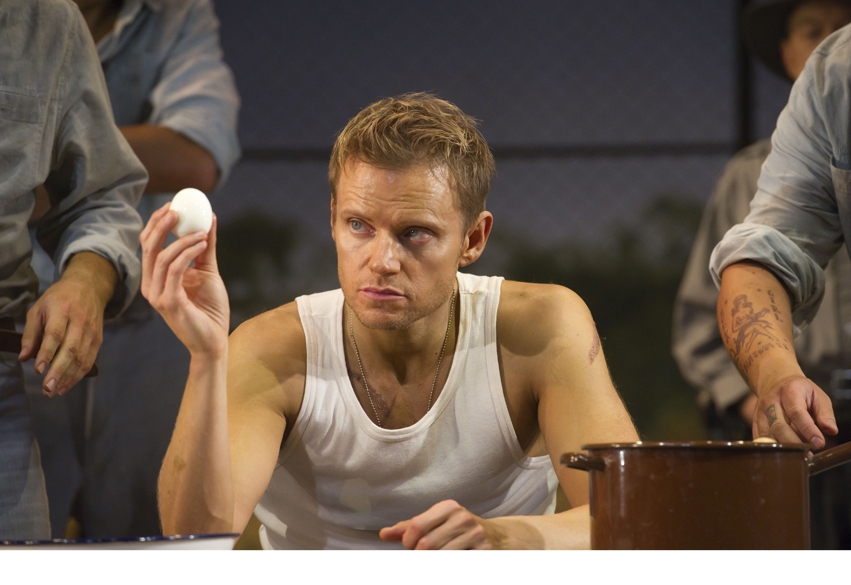Here’s an idea from the heyday of radio comedy. A soap star about to get the chop improvises an unscripted deathbed recovery during a live broadcast in order to save his career. I think it was Tony Hancock who starred in that sketch. To expand it into a full-length play would be quite a challenge. And in the 1960s Frank Marcus, a showbiz journalist, took on the job. And he struck gold. The Killing of Sister George triumphed in London and on Broadway. Now it’s back with a cast of starry comediennes.
Sister George, a district nurse, is the leading character in a popular Radio 4 soap opera. One day, on a whim, the BBC execs decide to bump off the character. This calamity tips the actor over the edge, and her woes are compounded when her sexy blonde flat-mate decides to ship out and find new lodgings.
This material might make a decent slice of comic knockabout but it all feels desperately slothful and dated. A play about showbiz needs to know its subject inside-out and to strike every note with unerring precision. But the script is as full of holes as a cobweb. Why the nation’s best-loved soap star is being tossed overboard isn’t fully explained. And the actress’s lack of alternative employment is another unsolved puzzle. The first half is a yawn that keeps on yawning. Only in the latter stages, when the lesbian subplot emerges, does the show acquire some bite and pathos. And at this point I realised what’s wrong. This isn’t a comedy at all but a melodrama about the hidden interface between power and lust.
Casting comediennes here was a blunder. It created false expectations. Some of the acting is powerful. Belinda Lang is wonderfully poised and stylish as an executive queen bee from Broadcasting House. Morwenna Banks, costumed in abrasive turquoise, shrieks and honks her way through a cameo role as a German psychic like Madame Arcati on crack. (Quite enjoyable, all the same.) The role of the actress playing Sister George is performed by Meera Syal, who emphasises the nastiness of a character already replete with malevolence. Theatrical lore advises actors to look for the flipside of every archetype. If you’re playing thrift, find generosity. If the character is tough find tenderness. Syal doesn’t quite manage this but she brings a certain tortured charisma to the part of the embittered control freak.
At the Aldwych, another 1960s flashback. Cool Hand Luke, based on the Donn Pearce novel, became a movie starring Paul Newman. It was a hit. And now we know why: Paul Newman. English actor Marc Warren can’t find any of the character’s softness or sexual allure. He just swaggers about like a noisy, aggressive, self-satisfied bullock. Prison dramas need heroism and hope. Here everything is petty, mundane and suburban.
Cool Hand Luke’s crime — vandalising parking meters while drunk — lacks any sense of uplift or splendour. His jailbreak efforts are magnificently feeble: while on chain-gang duty he asks to take a pee behind a bush and runs away. Later he drives off in the prison van. After each breakout he’s hauled back to the jail and laboriously beaten by cursing guards. It’s a curious sensation to watch a man being smashed to a pulp and not to give a damn either way. Because Luke has no purpose, no higher mission, it’s impossible to feel involved.
You start to reflect on the script’s oddities. Why ‘Luke’? Acoustic symmetry, perhaps. It sounds like ‘cool’ backwards. Cool Hand Tim? Cool Hand Maurice? Cool Hand Simon? Not really. Having solved that one you find yourself pleading with the author to give the leading man a bit of substance, a bit of hinterland. And here it is. We flip back to the war and discover that Luke was decorated by the US Army for killing Germans. And in peacetime the military hero is imprisoned for the far tinier atrocity of stealing cash from the coffers of his local town.
This moral peculiarity is thrown at us like a bolus of undigested food. It’s not analysed or discussed. Crucially, it doesn’t affect the action or propel the story forward. It just makes you shrug, like everything else here, in boredom and bafflement. The war passages include a scene showing American GIs trying to rape a German girl in 1945 (a real crowd-pleaser for the Yanks, that). Luke snatches the girl away and shoos her off with a drawn gun. ‘Go! Go!’ he yells. ‘And mind you fucking run fast.’ Goodness, what gallantry.
Critics are sometimes portrayed as people who ‘go to openings and try to close them’. This show, I fear, will complete the work unaided. To insult Americans in the West End is like emptying petrol over the foyer and shouting, ‘Match, anyone?’







Comments